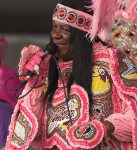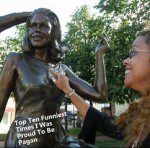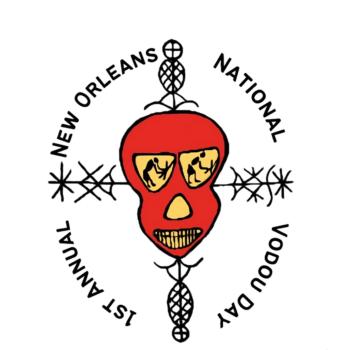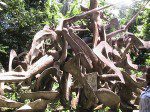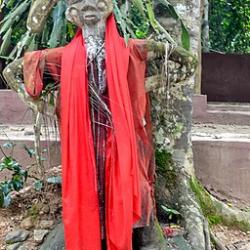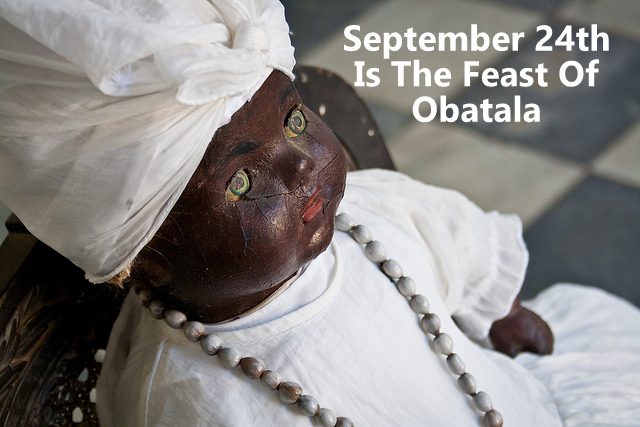
September 24th is the feast of Obatala, the La Regla Lucumi (Santeria) Orisha of the white cloth. Obatala represents purity, peace, calm and coolness. Obatala is a creator and is seen as being responsible for making all the humans in the world. The Ashe or sacred energy of Obatala resides in the clouds. While explaining this great force to someone the other day I reminded him that while the energy of the clouds is calming and relaxing, the lesson here is also not to get too far from the logical grounding influence of the earth.
Obatala Creates
There are many ritual tales told of Obatala, probably as many as there are voices to speak them. The first I would like to share here comes from AgoLaroye.com and tells of the beginning of mankind.
“Olofi came to the earth and told Obatala that it was needed for some type of life form to be on the earth. Olofi said that he wanted mankind to walk the earth but did not want them to have the ashe that the orishas have. Obatala agreed and told Olofi that he would help him create mankind. Olofi told Obatala that he would give him that task as he had other things to create within the heavens and space. Obatala bowed his head and agreed to create mankind. Obatala asked how should he create mankind and Olofi told him to make them in human form just as the orishas. Olofi told Obatala to form them and when he was ready to call him and he would come down and breathe life into them. Obatala agreed and with the sands of the earth he started to form and mold what we are today. After a few hundred of molds Obatala called Olofi to come breath air and life into the molds. Olofi came and saw miles upon miles of human molds lying on the sands of the earth and proceeded to blow life into them. Once life was blown, these humans stood up and were told to make prosperous and humble lives praising Olodumare as the creator. They went in different directions and started to live their lives.
This went on for days and Obatala worked hard making human forms. The sun was hot supplying light and energy to the land and it made the job hard to do. But one day Obatala grew very tired and decided to take a break of his task that Olofi asked of him. He walked over to a tree that was giving shade to the land and sat underneath it. He took a breather and reached for his white pouch where he had his oti. Obatala sat under the tree and started to drink his oti to quench his thirst. Without realizing, he drank all of his oti and he had none left. Obatala stood up and staggered over to where his molds were. He began again molding and shaping human forms. But without noticing, his molds and creations were coming out a little weird. He made molds that were missing limps, he made deformed bodies, he made molds with no type of pigmentation and so forth. When he finished he did what he usually does and summoned Olofi to breathe life into them.
Olofi came to the earth and saw the molds lying lifeless on the sands and since he trusted and reviewed Obatala’s work in the past he did not notice that these molds were different. Olodumare proceeded to breathe life into these humans. When life was given to them, they stood up and Olofi noticed that they all had different deformed bodies. Olofi got upset and questioned Obatala on this creation he did. Obatala seeing this, knew that he did something wrong and disrespected Olofi’s overall dream. Obatala told Olofi that he was drinking and it made his mind blurry and he did not mean to do this. He begged Olofi for forgiveness and told Olofi that from this day forward he would take all of those creations as children of him. He would take care of them and look after them and keep them from harm. Olofi shook his head and accepted Obatala’s apology and request. Obatala also told Olofi that he would never drink again due to what he did with the creations of man. ”
This pataki, or legend, tells why Obatala is one of the few Orisha who is never offered alcohol. The children of Obatala have to be careful drinking any amount as they are more likely to have a drunk than a drink. Caution, logic, and humility are foregrounded here as some of the lessons Obatala points out for us. One of my favorite stories of this king tells of a visit he made.
The King of the White Cloth
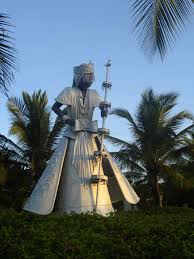
One of the praise names for Obatala is the “King of the White Cloth.” Obatala always dresses in the most fine white robes and attire. These white robes were in place when Obatala set out to visit his son Chango, ruler of one of the distant kingdoms. He had consulted Orunmila before his trip, and the divination advised that he should not go. If he was to go however, he must bring 3 changes of clothes.
Obatala started off down the road. He quickly came upon Eleggua, dressed as an old man begging for help. ” I have this gourd full of palm oil, can you please help me. ” Obatala tried to help but got splashed with the red palm oil, and his robes became stained. Obatala changed into a new set of his fine white robes and continued. He met Eleggua a little further down the road, and the same thing happened again, and again, and again. On his last set of robes Obatala decided to continue despite the setbacks. He came to a meadow, there he saw one of his son Chango’s horses running wild . He tried to capture it. Running through the field his last set of pristine whites became soiled. It was then that some of Chango’s servants noticed what they saw to be an old dirty man trying to steal Chango’s horse. They apprehended him and put him in the dungeon. He protested “I am Obatala, father of the King.” They laughed and responded “Everyone knows Obatala is the King of the White Cloth, you are filthy.” He stayed there for a long time until Chango consulted his own diviners who through Orunmila learned that Obatala has been falsely imprisoned.
Offerings For Obatala
Cotton
Cascarilla
Cocoa Butter
White Yams
White Flowers
Coconut Milk
Many, including myself, are calling for Obatala’s feast day as a time to pray for peace,justice and calm in the world. Please join me in lighting a candle this September 24th to help bring a shining light of peace.


